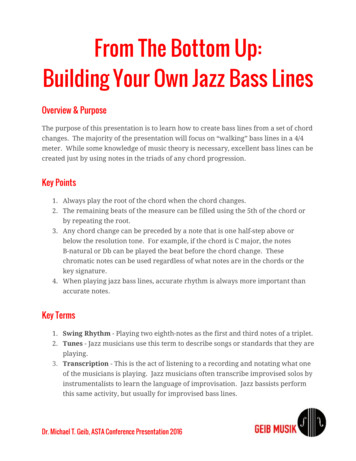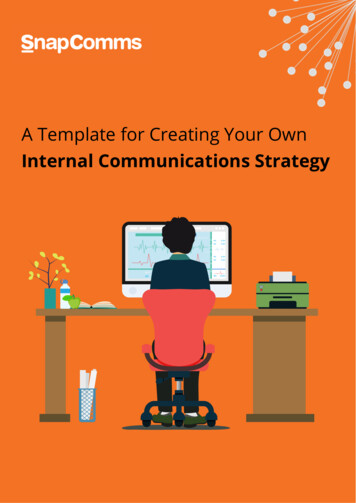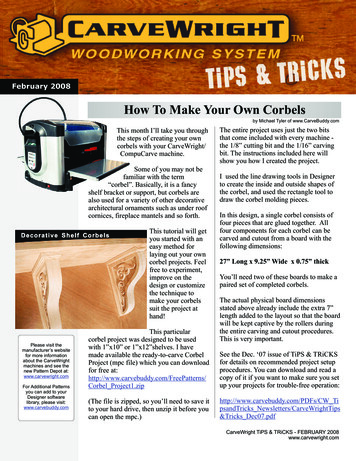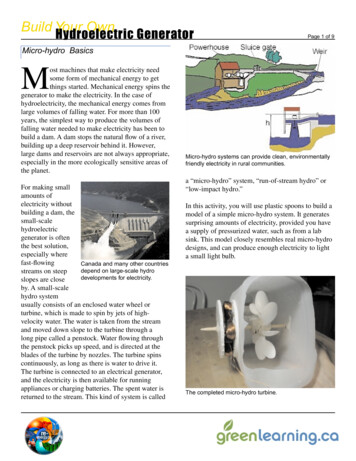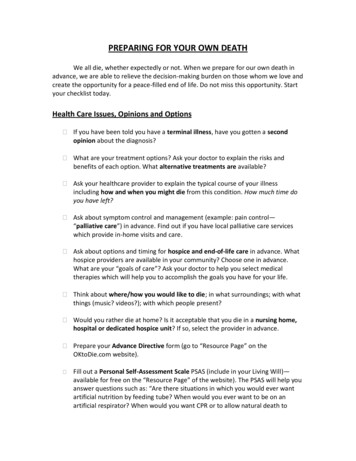
Transcription
PREPARING FOR YOUR OWN DEATHWe all die, whether expectedly or not. When we prepare for our own death inadvance, we are able to relieve the decision-making burden on those whom we love andcreate the opportunity for a peace-filled end of life. Do not miss this opportunity. Startyour checklist today.Health Care Issues, Opinions and Options If you have been told you have a terminal illness, have you gotten a secondopinion about the diagnosis? What are your treatment options? Ask your doctor to explain the risks andbenefits of each option. What alternative treatments are available? Ask your healthcare provider to explain the typical course of your illnessincluding how and when you might die from this condition. How much time doyou have left? Ask about symptom control and management (example: pain control—“palliative care”) in advance. Find out if you have local palliative care serviceswhich provide in-home visits and care. Ask about options and timing for hospice and end-of-life care in advance. Whathospice providers are available in your community? Choose one in advance.What are your “goals of care”? Ask your doctor to help you select medicaltherapies which will help you to accomplish the goals you have for your life. Think about where/how you would like to die; in what surroundings; with whatthings (music? videos?); with which people present? Would you rather die at home? Is it acceptable that you die in a nursing home,hospital or dedicated hospice unit? If so, select the provider in advance. Prepare your Advance Directive form (go to “Resource Page” on theOKtoDie.com website). Fill out a Personal Self-Assessment Scale PSAS (include in your Living Will)—available for free on the “Resource Page” of the website). The PSAS will help youanswer questions such as: “Are there situations in which you would ever wantartificial nutrition by feeding tube? When would you ever want to be on anartificial respirator? When would you want CPR or to allow natural death to
occur?” Your family, surrogate medical decision-maker, and physician should allhave updated copies of your PSAS.My Required End-of-Life Paperwork (Medical and Legal) Do I have an advanced directive(s) included in my living will? Is it legal for mystate? (Include a PSAS to help your healthcare provider and proxy/family toknow at what stage of illness you choose to forgo certain medical interventions.) Have I selected a Health Care Proxy and executed a Health Care Power ofAttorney? Please specify 1 or 2 alternative proxies as well. (Health Care Proxy isa legal term for surrogate medical decision-maker, the person who will makemedical decisions for you should you become unable to make them for yourself). Have I set up a POLST (Physician Orders for Life Sustaining Treatment), if thePOLST program is legal in my state? Or, if the POLST is unavailable, have I askedmy physician to sign a state-approved Do Not Resuscitate/Allow Natural Deathorder, if desired? Go to the Resource Page and click on POLST to learn more. Have I executed a legal DNR (Do Not Resuscitate) Order? The DNR is a medicalorder signed by a physician instructing health care workers not to perform CPRon you, but instead to allow you to die naturally and in comfort. Have I executed a legal DNI (Do Not Intubate) Order? The DNI is a medical ordersigned by a physician instructing health care workers not to intubate you orplace you on an artificial ventilator if your breathing is failing. Have I executed a legal DNH (Do Not Hospitalize) Order? The DNH is a medicalorder signed by a physician instructing health care workers not send you to ahospital from your home or nursing home facility unless needed for comfort. Does my Health Care Proxy have a copy of my Living Will containing my advancedirectives such as POLST, PSAS, DNR, etc.? Make certain to keep handy yourcopy of these documents. Tell family members where you keep the originals andyour handy copy. Family members, surrogate medical decision-makers and yourphysicians should all have copies of these items as well. Do I need to update my trust? (Contact an Estate Attorney.) Have I set up my estate plan? (Contact an Estate Attorney.) Is my will up to date?
Have I executed a Financial Power of Attorney?Personal Communications with Your Family and Friends Have I discussed my condition with my family/friends in complete honesty? Have I told my loved ones EXACTLY what medical interventions that I want anddo not want? Do they know at what stage of illness I would choose to forgocertain therapies or artificial life support ? Share your PSAS and/or POLST, DNR,DNI, DNH papers with them. My family needs to know who I have put in charge of my medical decisions whenI can no longer make them. My health care proxy or surrogate medical decisionmaker needs to understand and agree to carry out my wishes and desiresregarding my end-of-life care. Do I need a private discussion with anyone, if it would help them to accept mydecision? (If I’m OK to Die, are they?)Am I OK to Die? Say the “6 Things” you need to say to your loved ones, friends and enemies. It isnever too early to say these things. (See Chapter 17 in It’s OK to Die.)“I’m sorry.”“I forgive you.”“Thank you.”“I love you.”“It’s OK to die.”“Goodbye.” What are my beliefs about death? Do I need to make peace with myself or aHigher Power? Do I need psychological, emotional, spiritual care, counseling or support? Have I left a legacy? Identify life lessons, advice, hopes and dreams that youwould like to pass on to family and friends. Write or record these. Identify a
person who can pass these along to the people to those whom you wish toreceive your legacy. See Dignity Therapy on the Resource Page. Have I written my personal history? You can write it down, or record on audio orvideo tape, etc. Who is to get my personal history?Personal Clean-up Do I have anything amiss with my family/friends to fix? Can I fix them now? Do I have letters to write? Calls to make? Make a list of all old grudges, enemies,etc., and attempt to settle those affairs. You may use the “6 things” as a guide. Have I created my “bucket list”? What am I able to accomplish with the time Ihave left? Use this list to help create your “goals of medical care. ”Insurance Issues In order to prepare, I need to buy life insurance--at least a death benefit policyto pay for funeral/burial if I don’t have the money for it. If I have life insurance, are my policies all in order? Have I placed original policieswith my important papers in a safe place where my family and/or executorknows where to find them? Do I have/need long-term care policy, disability policy, life policy? Contact my life insurance company--sometimes they pay out in advance ofdeath for a terminal disease, so I can pay for arrangements/details or maybeeven a last fling!!!Financial Issues Complete my financial checklist. (A complete financial checklist is too long to beincluded here. You should consult with an accountant or lawyer to create andcomplete such a checklist.) Check out our Resource Page on the website for asample. Who will pay my bills during the immediate time after my death?Spouse? Accountant? Lawyer? Estate Manager? Executor?
Who will be in charge of discontinuing services no longer needed which are inmy name?Business Arrangements Complete a “business survival” plan. Do I need “key man” insurance? (This insurance covers the loss of a businessowner or partner so that the business can continue.) Do I need to sell or transfer my business interests?Personal Effects Who do I give my personal belongings to? If you are married, most likely all ofyour belongings will transfer to your spouse or family. If you are single, then youmust specify what you want done with these items Who gets my special items, such as photos, mementos, etc.? Have I labeled (ID’d) the people in my photos? Who do my photos (pictures,negatives, discs, etc.) go to? If I am single and have kids, have I set up a guardian for my children for theimmediate time after my death? Short-term money for them? Have I set up the paperwork for where my children will go permanently? What should I sell before my death? House? Car? Furniture? Land? Have I made arrangements for the care of my pets? What unfinished projects around the house, at work, or in the community wouldI like to complete? If I have young children, have I left letters or videos to them? Are all my digital photos/videos in one place? What about my computer(s)?
Funeral Planning and Logistics Where do I want my body to be taken? Which funeral home/mortuary? Do I want to be embalmed? Buried? Cremated? What are my Burial/Casket preferences? Who do I want notified of my death? Do I want to write my own obituary? Do I have burial plot? If cremated, where should my ashes be scattered orinterned? Do I want/need a headstone/grave marker? Have I written out what I wantinscribed on it? Design? Do I want a Funeral service? Program? Do I have special needs for my ceremony? Military? Religious? Who will deliver the eulogy? Ask him or her in advance. Should I pre-pay funeral expenses? Do I want to identify a charity “in lieu of flowers”? Do I want a wake or memorial party instead of a funeral? Who needs to be made aware of my death? Make a contact list for your funeralor memorial notices.Planning for your own death—whether that is expected or not—takes a lot of timeand energy to complete. It is much better to take the time now, while you have it, tolay out your plans, wishes, directions and desires, so your passing will be peaceful, forboth you, your family and friends.If you have additions or suggestions for this checklist, please contact us via thewebsite OKtoDie.com OR email us at Info@oktodie.com.***This checklist contains suggestions. You will need to consult with your own professional financial, legal, medical, etc. advisors.
We all die, whether expectedly or not. When we prepare for our own death in advance, we are able to relieve the decision-making burden on those whom we love and create the opportunity for a peace-filled end of life. Do not


